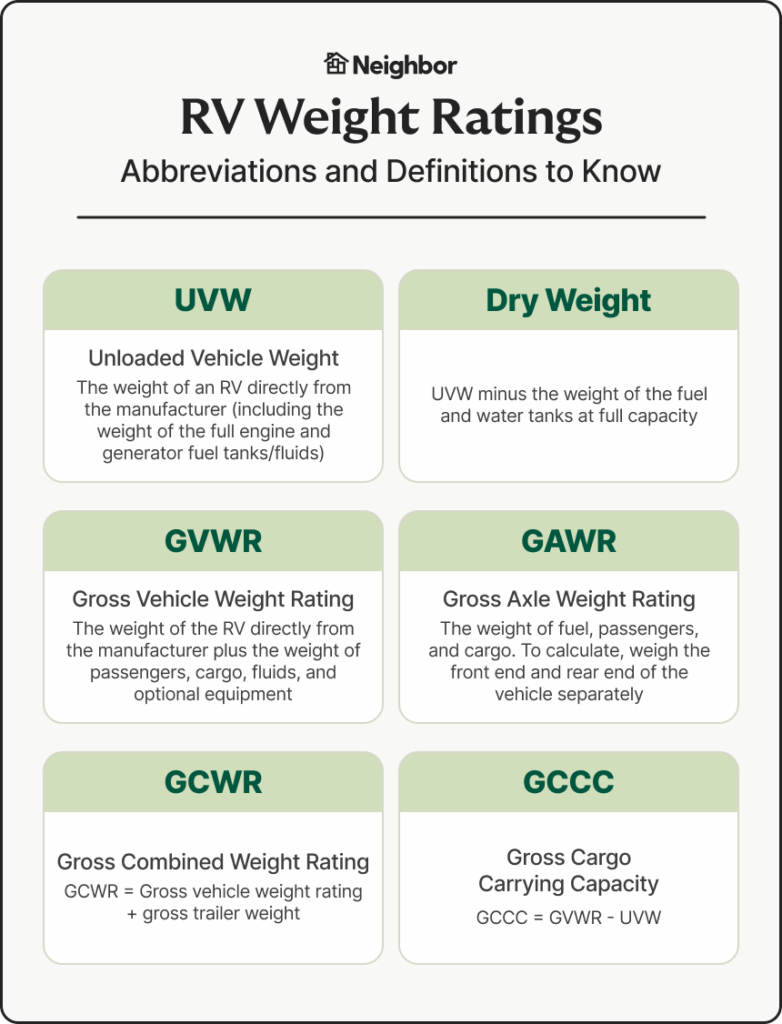Whenever you break into a new hobby, you’ve got to learn the language, and RVing is no different. Acronyms and jargon abound here: UVW, GCWR, CCC, dry weight, GVWR, etc. They all get a bit cumbersome.
While some acronyms are essential for safely operating an RV, others you’ll only use once or twice. Knowing the difference is the first step to making safe decisions and enjoying the road trip ahead.
What’s Your RV’s Unloaded Vehicle Weight (UVW)?
“UVW” or “unloaded vehicle weight” is the weight of an RV directly from the manufacturer, including the weight of a full engine and generator fuel tanks and fluids. This metric doesn’t include the weight of…
- Cargo
- Water
- Propane
- Any dealer-installed accessories.
Note: You need to know the UVW to compute other weights like cargo carrying capacity (CCC) and payload.
The UVW is also key in determining the Gross Combined Weight Rating (GCWR) for towing an RV. That way, you know how much gear you can pack in your RV and still safely drive or tow it. All in all, UVW is critical for a safe and legal trip in your RV.
This brings us to the question: What is dry weight, and how does it differ from UVW?
RV Dry Weight
While your RV’s UVW and dry weight are likely close to the same amount, they are NOT the same thing.
Your RV dry weight refers to the weight of a vehicle or trailer when it has only standard equipment. This weight does not include…
- Fuel
- Fluids
- Cargo
- Passengers,
- or optional equipment.
So, the difference between the RV’s dry weight and UVW is that the dry weight doesn’t include fuel and water tanks at full capacity – hence the term dry weight.
Breaking Down RV Weight Ratings
When it comes to managing your RV’s weight, there are several key ratings that you need to be familiar with. Each of these ratings helps you choose how to safely and legally haul your RV.
Gross Vehicle Weight Rating
Also known as GVWR, the gross vehicle weight rating is the maximum allowable weight of the fully-loaded vehicle, including passengers, cargo, fluids, and optional equipment. To determine your RV’s actual Gross Vehicle Weight (GVW), drive it onto a scale and record the weight at that time.
Gross Axle Weight Rating
Gross Axle Weight Rating, or “GAWR,” is the maximum allowable weight each axle of the vehicle can take.
To prevent unnecessary wear on your tires and decrease your chances of a blowout, ensure your RV’s weight is evenly distributed.
Gross Combined Weight Rating
The GCWR represents the maximum permissible weight of the vehicle and any towed vehicle or trailer.
If you want your brakes to work properly on your road trip, don’t ignore this number. Not all brakes can stop a 26,000-lb trailer, even if they’re new. So don’t push it.
If you want to avoid damaging your RV or towing vehicle (and ultimately prevent hazardous driving conditions), don’t ignore these weight ratings. They help keep your RV within safe and legal limits.
Here’s Another One: Cargo Carrying Capacity (CCC)
The Cargo Carrying Capacity (CCC) is the amount of cargo in pounds that you can add to your RV without exceeding the Gross Vehicle Weight Rating (GVWR).
To calculate your Gross Cargo Carrying Capacity (GCCC), subtract the unloaded vehicle weight rating (UVWR) from its Gross Vehicle Weight Rating (GVWR).
UVWR – GVWR = GCCC
The GCCC helps you determine how much cargo and/or how many passengers you can safely bring.
When making alterations to your RV, such as aftermarket add-ons like awnings, a generator, or solar panels, it’s important to remember that these modifications will increase the vehicle’s weight and consequently reduce its cargo-carrying capacity.
What About the Tow Vehicle’s GVW?
During the RV buying process, you’ve probably considered purchasing a designated tow vehicles for towing an RV trailer. When shopping, check the max towing capacity, so you get one with a tow rating that’s capable of pulling the loaded trailer of your choice, but does that rating include the vehicle’s GVW (Gross Vehicle Weight)?
The answer is this; you still have to add the tow vehicle’s GVW to the trailer’s GVW. Once you add those two together and get the combined weight rating (remember the GCVW?), then you’ll know if that tow vehicle is a good fit for your choice travel trailer.
Also, don’t forget that your hitch has to be rated for the trailer’s GVW as well.
Note: There are ways to increase your vehicle’s towing capacity. Read more here.

How Do You Weigh Your RV?
Sure, you could base your calculations on the estimated weight (rather than your RV’s exact weight), but for certain regulations, that won’t be good enough.
Accurately weighing your RV ensures that you comply with weight ratings and avoid potential damage to your vehicle and tow vehicle.
For information on your RV’s weight ratings, check the yellow sticker, located near the main entry door of your RV.
For the actual weight of your RV when loaded, you need to visit a weigh station.
Here are some ways to weigh your RV:
- Driving onto platform scales at a local truck stop
- Using the wheel position weighing procedure at RV weigh stations
- Use CAT scales at a truck stop to provide a comprehensive weight report that includes each axle’s weight and your RV’s total weight.
By employing one of the above methods, you can pinpoint the exact weight of your RV and feel the utmost confidence that you aren’t exceeding the maximum cargo carrying capacity.
Staying Within Safe Weight Limits
It’s important to remember that these ratings are for safety purposes.
If you overload your rear axle, you risk a blowout. Overload your camper and use a vehicle not rated to tow it, and you risk compromising your brakes when you need them the most.
If you have a truck that can tow your trailer, but your hitch weight or pin weight is too low, the actual weight pressing down can cause the hitch to bend or the pin to break. And that’s a bad day for all involved.
Bottom line: Know your weight ratings and don’t exceed them.
Legal and Warranty Requirements: When Does The Weight of An RV Matter
If avoiding life-threatening scenarios isn’t motivation enough, remember that you are legally required to comply with these ratings and could face hefty fines or lawsuits if you choose not to and end up in an accident.
Also, remember that the manufacturer defines dry weight for you, meaning they decide how to tow your fifth wheel safely. Now isn’t the time to act off instinct. Exceeding these weight limits can also void your warranty and restrict its coverage.
Before You Go
Don’t let all the acronyms scare you. It all comes down to four easy steps:
- Choose a good tow vehicle and accessories with a rating that can tow your trailer’s weight.
- Determine how much you can carry. (UVWR – GVWR = GCCC)
- Distribute the weight evenly over your axles.
- Weight your RV loaded with your tow vehicle to confirm you’re under the maximum loaded trailer weight.
Practically speaking, it’s that simple.
Knowing these weight ratings is all about keeping your RV safe on the road, but safely storing it when it’s off the road is important, too. That’s where Neighbor can help.
Neighbor.com is a peer-to-peer marketplace that provides safe, nearby, and budget-friendly storage spaces for RVs.
And if you’re interested in learning more about the different types of motorhomes, check this out.







